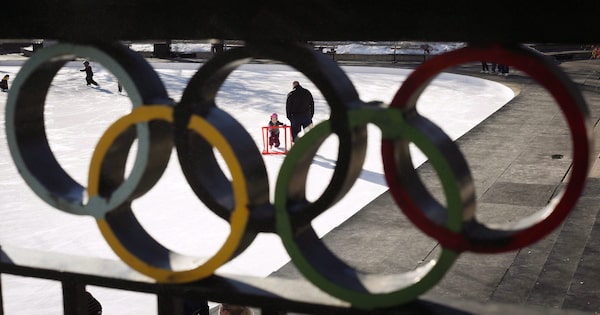Calgary has moved a step closer toward seeking its second Winter Games after the Canadian Olympic Committee backed the city’s potential bid.
The COC’s endorsement is being hailed by supporters as an important milestone while critics point out that a civic plebiscite is slated for late 2018 on whether Calgary should even strive to play host to the 2026 Winter Olympics.
“We will continue to work with all the relevant stakeholders to build momentum to ensure an inspiring and responsible Olympic bid,” COC president Tricia Smith said in a statement on Saturday.
Calgary, which hosted the 1988 Winter Games, would be the lone candidate within Canada to vie for the 2026 event against several competing bidders such as Sapporo, Japan, and the Swedish capital of Stockholm.

A young girl learns to skate on the ice at the 1988 Calgary Olympic Plaza. (File Photo).Jeff McIntosh/The Canadian Press
Critics argue that the costs of being the host city will far outweigh the benefits.
“It was a good feeling in 1988, but times have changed since then,” Calgary councillor Sean Chu said in an interview on Sunday. Mr. Chu, who moved to Calgary in 1985, said he hopes a plebiscite that could be held in November will derail the city’s dreams for 2026.
“With terror attacks in the world, you think it will be cheaper for security? It’s going to be too expensive. It’s a money pit,” said Mr. Chu, a former Calgary police officer. “Olympic Games face cost overruns, and you can’t give a blank cheque.”
Alberta and Ottawa have agreed to financially back Calgary’s potential bid, subject to public support in the plebiscite. Calgary bid organizers have estimated that holding the Winter Olympics will cost $4.6-billion and run a deficit.
Moshe Lander, a sports economist at Concordia University in Montreal, said the final costs are bound to be sharply higher than originally thought.
“Calgary had one big outdoor party in 1988 with everybody mingling. Now you’re talking about barricades and safe zones,” Mr. Lander said.
Montreal continues to feel the economic pain from playing host to the 1976 Summer Olympics, he said. “Living in Montreal, I’m reminded every day looking at the Olympic Stadium of what a financial disaster can be,” Mr. Lander said.
Vancouver’s 2010 Games were the last Olympics to which Canada played host.
It made sense for Vancouver, along with nearby Whistler, to successfully bid for the Olympics since it placed a spotlight on British Columbia, which had not previously held the Winter Games, Mr. Lander said.
“There’s nothing really to be gained by Calgary because it’s already hosted the Olympics. Calgary, Canmore and Banff are already known internationally for winter sports,” he said.
But Scott Hutcheson, chairman of the Calgary 2026 bidding group, said after the COC’s unanimous endorsement that there are wide-ranging benefits to be gained.
“We have much work ahead of us, but this is a positive step forward on the road to preparing Calgary to bid for the Olympic and Paralympic Winter Games 2026,” he said in a news release issued by the COC. “Together, we will work on behalf of the community to deliver a transparent and dynamic bid that should present tremendous benefits for all Canadians.”
In addition to Sapporo and Stockholm, bidders that have thrown their names into the ring for 2026 include Graz, Austria; Erzurum, Turkey; and a joint proposal by Milan and Turin, Italy.
The International Olympic Committee will invite formal bids starting in October, followed by choosing the winning submission in September, 2019.
 Brent Jang
Brent Jang